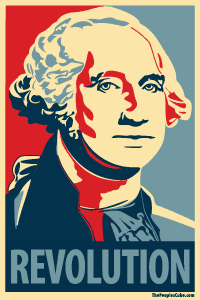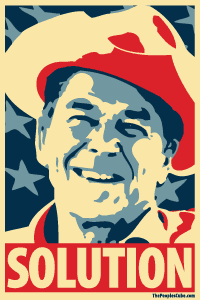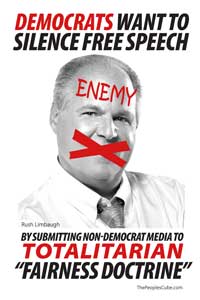MEMORANDUM: Exercising Prosecutorial Discretion with Respect to Individuals Who Came to the United States as Children [PDF]
June 20, 2012 by Leave a Comment
I Oppose Barack Obama Because He’s Black
June 19, 2012 by 1 Comment
By Andrew Klavan | June 18, 2012 | PJ Media

Sam Donaldson, who regularly treated President Ronald Reagan with disrespect, feels he knows exactly why Neil Munro of the right-leaning Daily Caller treated Barack Obama with disrespect. During the president’s recent announcement that he had decided to make up laws by himself from now on, effectively granting immunity to some illegal aliens with a wave of his almighty hand, Munro shouted out a question rather than waiting for the president to leave the podium without taking any questions.
Donaldson’s reaction in part: “Many on the political right believe this president ought not to be there – they oppose him not for his polices and political view but for who he is, an African American!”
Obama’s Post-Constitutional Wingmen
June 19, 2012 by Leave a Comment
By Jeffrey Lord | June 19, 2012 | American Spectator
Access, bias, herd mentality in Munro incident — the corruption of the White House press corps.
“Good evening, everybody. (Applause.) I would like to welcome you all to the 10-day anniversary of my first 100 days. (Laughter.) I am Barack Obama. Most of you covered me. All of you voted for me. (Laughter and applause.) Apologies to the Fox table. (Laughter.) They’re — where are they? I have to confess I really did not want to be here tonight, but I knew I had to come — just one more problem that I’ve inherited from George W. Bush. (Laughter.)”
— President Obama addressing the 2009 White House Correspondent’s Dinner
You don’t interrupt the president.
So goes the media narrative in the wake of the media hysteria surrounding the Daily Caller‘s Neil Munro and his so-called “heckling” of President Obama.
Yeah, right. This is bunk.
A pluperfect illustration of a double-standard, as was illustrated in this space yesterday with a video clip of the White House press corps not only interrupting then-President Ronald Reagan as he read a statement but then shouting and shrieking at him as he left the room.
Rush Limbaugh: “How cheap. How clichéd. How simplistic. How predictable. How utterly ignorant…” [Video]
June 19, 2012 by Leave a Comment
Obama Campaign Sends ‘Dreamers’ Fundraising Email Hours after Amnesty Announcement
June 19, 2012 by 1 Comment
By Penny Starr | June 18, 2012 | CNS News

“Right to Dream” students and supporters block the street outside the federal Metropolitan Detention Center Friday June 15, 2012, in Los Angeles to celebrate the Obama administrations decision to stop deporting younger illegal immigrants. Obama says his plan to stop deporting younger illegal immigrants who came to the U.S. as children will make the system “more fair, more efficient and more just.” (AP Photo/Nick Ut)
(CNSNews.com) – Seven hours after President Barack Obama announced that some illegal aliens would be allowed to stay in the United States and could be allowed to work here, Katherine Archuleta, Obama’s national campaign director, e-mailed a fundraising letter seeking donations to his re-election effort.
The e-mail, with the subject line “wonderful news,” contains links to the website, where visitors can listen to Obama’s speech on immigration he gave at 2:08 p.m. on Friday in the White House Rose Garden.
Archuleta – who was hailed as the first Latina to run a major presidential campaign when she was named director in June 2011 – sent the e-mail at 9:08 p.m.
“Thanks to our president, this nation’s immigration policy just became more fair and more just,” the letter begins.
Only Voters Can Hold Obama Accountable For Illegal Amnesty Policy
June 18, 2012 by Leave a Comment
By Ken Klukowski | June 17, 2012 | Breitbart News
‘This is What a Dictator Does’- Beck Savages Obama’s Fiat on Illegal Immigrants [Video]
June 15, 2012 by Leave a Comment
Read the full article here.
Obama Amnesty Plan: Catch, Release, Vote
June 15, 2012 by 1 Comment
By Rush Limbaugh | June 15, 2012 | RushLimbaugh.com
BEGIN TRANSCRIPT
RUSH: I have a name for this new Obama immigration policy. In case you haven’t heard, folks, very quickly. The regime today told the border agents: “If you catch young illegals, let ’em go and grant ’em work permits.” No more deportation of illegal immigrants. They are to be given work permits and they can stay in the country. So what this is is “Catch, Release, Vote.”
JOHNNY DONOVAN: And now, from sunny south Florida, it’s Open Line Friday!
RUSH: That is exactly what this is: Catch, Release, Vote.

Executive Fiat: Obama Ignores Constitution in Display of Crass Political Calculus [Video]
June 15, 2012 by 1 Comment
As Commandos Raid Tampa, US State Dept Demands Power to Declare War?
May 27, 2012 by 4 Comments
By Anthony Wile | May 26, 2012 | The Daily Bell
Clinton Goes Commando, Sells Diplomats as Shadow Warriors … Clinton, wearing pearls and a silver and black blouse, climbed the stage and began to speak. And soon it all made more sense. She had an idea to sell — and to defend … She described a vision in which shadowy U.S. and allied Special Operations Forces, working hand in hand with America’s embassies and foreign governments, together play a key role in preventing low-intensity conflicts. And where prevention fails, the same commando-diplomat team goes on the attack … – Wired (5/24/12)
It happened again at the recent Tampa-based conference, “Building the Global SOF Partnership” …
The US military staged a mock drill in violation of 130+ years of the Posse Comitatus Act that bars domestic forces from active use on US soil.
Obama as Farce
April 12, 2012 by 2 Comments
By William L. Gensert | April 11, 2012 | American Thinker
Karl Marx said history repeats itself, “first as tragedy, then as farce.” Barack Obama has reversed that. His first term was certainly farce; his second will be tragedy.
Obama has Forrest Gumped his way through his presidency, except without the success, charm, and endearing sweetness of the original. He has given America three and a half years of farce, even if no one is laughing.
He is an adumbrated president, desperate about his re-election prospects. Sold as a bipartisan moderate, a post-racial healer, a transformative leader — we were told he would not just solve our problems, but heal the earth and save humanity.
The president has governed as a hyper-partisan, race-baiting, barely present tyrant with absolutely no leadership skills and little regard for the constitution. His daily ululations paint anyone who dares to disagree as evil and un-American. People are either pro-Barack or an enemy of the nation — there is no in-between.
It is the intangible aspects of the presidency where Barack Obama is most adept: entertaining, vacationing, and golf. The parties are legendary and extravagant. Bringing the NBA to the White House, or the NFL or Motown or Broadway — when he feels like it, the party comes to him. The vacations are even more extravagant, and the golf…everyone knows about the golf. He may not be good, but at least he puts in the time.
America has to pay for it all, but this is an opportunity to see the true Barack Obama, surrounded by minions and sycophants constantly telling him how great he is. Is it any surprise he wants four more years of this?
Obama hagiographer Davis Guggenheim has said, “I mean, the negative for me was there were too many accomplishments.” Barack wholeheartedly agrees; after all didn’t he recently say, “My entire career has been a testimony to American exceptionalism”?
Popeil’s Pocket President, brought to you by Ronco, or Rahm Emanuel — one of those. At least the Pocket Fisherman worked. Barack doesn’t work; it’s all parties, vacations, and golf — in between, he practices verbal assassination of anyone who disagrees. Chin up, he turns away and looks off in the distance, à la Mussolini, as the applause and adulation reverberate from the rafters.
“No, please,” he pleads, “I do this for you.”
In less than four years, he has reduced America to the laughingstock of the world. We are threatened by Iran with nuclear Armageddon, while he lines up a putt and tells us what his imaginary son would look like.
He talks of “flexibility,” while he plots both unilateral disarmament and the scrapping of missile defense. With no deterrent and no defensive capability, the nation will be defenseless and impotent.
Read the full article here.
Related Articles
- How Tall is Barack Obama Height and Weight (celebrityheightandweight.com)
- Barack Obama, his friends and what they stand for (theconservativehillbilly.wordpress.com)
- Obama 2012 – May The Farce Be With You | Veterans Today (gunnyg.wordpress.com)
- Faith-based farce (thehill.com)
- Obama Video Rips Obama’s Egomania and Highlights Tea Party Movement (prweb.com)
- Obama Looked At Bigger Picture In Harvard Law Election (buzzfeed.com)
- FreeStatePlus: “Barack Obama’s Brazilian model”: The Real Obama Vision for America (freestateplus.wordpress.com)
- Obama Hagiographer Davis Guggenheim Claims There’s Nothing About Obama He Can Fault (minx.cc)
- Stupid Senator Stupidly Calls President Obama Stupid [Polidicks] (jezebel.com)
What’s Obama Thinking? Wickard, not Marbury
April 8, 2012 by 4 Comments
By Neo-Neocon | April 6, 2012 | PJ Media
When he talks precedence, he means the astounding 1942 case.
Obama’s remarks about the Supreme Court and ObamaCare have been criticized by conservative pundits as intemperate, inflammatory, and ignorant. What was he thinking when he said the Court would be taking an “unprecedented, extraordinary step” if it overturned a law duly passed by Congress? How could a constitutional law professor not have heard of Marbury v. Madison, which long ago established that the Court may do exactly that?
When Obama attempted damage control the next day, his remarks provided a clue as to what he might have been thinking in terms of precedent — and it wasn’t Marbury v. Madison:
[L]et me be very specific. We have not seen a Court overturn a law that was passed by Congress on a economic issue, like health care, that I think most people would clearly consider commerce — a law like that has not been overturned at least since Lochner. Right? So we’re going back to the ’30s, pre-New Deal.
[T]he Court has traditionally exercised significant restraint and deference to our duly elected legislature, our Congress. And so the burden is on those who would overturn a law like this. … I expect the Supreme Court actually to recognize that and to abide by well-established precedence out there.
In the late 1930s, Franklin Delano Roosevelt was proposing — and the Democratic Congress under him was passing — laws that would have required the Court to allow the federal government power to regulate interstate commerce far beyond any that had been granted before in this country. The resulting fight within the Court was similar to the battle today: textualists and originalists on the conservative side; proponents of a living Constitution almost infinitely malleable on the liberal side.
FDR first tried to retaliate against the conservative justices by packing the Court. That attempt failed, but his intimidation nevertheless managed to transforms the Court into an instrument far more in line with his wishes. The shift had an especially profound effect on the judicial review of legislative actions that affect commerce:
Prior to the New Deal the judiciary was seen as guardian of the Constitution, ensuring that government activities of all kinds squared with the principles of the federal charter. Following the New Deal era, the judiciary’s function changed to one of “bifurcated review,” allowing great deference to the political branches in regulating economic matters and applying heightened scrutiny to government encroachments on civil liberties. [emphasis added]
It didn’t hurt, either, that during his extended tenure as president Roosevelt ultimately appointed eight of its nine justices, affecting the Court’s tenor long past his service and solidifying the extreme liberalizing trend.
How liberal and how extreme? Although Charles Dickens had his Oliver Twist character Mr. Bumble famously declare the law to be “a ass,” most people may not realize just how big an ass the law can be until they study the 1942 Supreme Court ruling Wickard v. Filburn.
Read the full article here.
Related Articles
- Marbury v. Madison Debate Sparked by Obama’s Supreme Court Health Law Remarks (blippitt.com)
- Unforced Error (wingoperie.wordpress.com)
- Obamacare and the Relevance of Marbury v. Madison (coppellpianoshop.wordpress.com)
- The Vetting: Obama Channels Derrick Bell in Attack on Supreme Court (johnmalcolm.me)
- Obama Eats His Words on Health Care Law (socyberty.com)
- Rush Limbaugh: How to Respond to Obama’s Lies? (johnmalcolm.me)
- 5th Circuit Lays the Smackdown on Obama (fellowshipofminds.wordpress.com)
- On health care law, who’s the judicial activist? (politico.com)
- AG Eric Holder to 5th Circuit: We’re aware of Marbury v. Madison (legaltimes.typepad.com)
Is Obama ‘Dangerously Close To Totalitarianism?’ [Video]
April 6, 2012 by 5 Comments
IBD Editorials | April 05, 2012 | Investor’s Business Daily
Power: Given the president’s end-runs around Congress, his shredding of the Constitution and his assault on the authority of the courts, a second term free of electoral restraints may be a frightening prospect.
Judge Andrew Napolitano, a Fox News commentator, raised the question on Neil Cavuto’s “Your World” show Wednesday. And while it seems fanciful in light of the safeguards built into our democracy and its institutions, it recognizes the threat posed by the president’s policies and actions if left unchecked.
“I think the president is dangerously close to totalitarianism,” Napolitano opined.” A few months ago he was saying, ‘The Congress doesn’t count, the Congress doesn’t mean anything, I am going to rule by decree and by administrative regulation.’
“Now he’s basically saying the Supreme Court doesn’t count. It doesn’t matter what they think. They can’t review our legislation. That would leave just him as the only branch of government standing.”
Read the full article here.
Related Articles
- Judge Napolitano: “Obama Is Dangerously Close to Totalitarianism…No president in modern times has questioned their [SCOTUS] authority” (destructionist.wordpress.com)
- You have to love Investors Business Daily (maureenholland.wordpress.com)
- Is Obama ‘Dangerously Close To Totalitarianism’? (1oneday.wordpress.com)
- Prison Planet.com ” Judge Napolitano: “Obama Is Dangerously Close to Totalitarianism” (gunnyg.wordpress.com)
- Judge Napolitano: I Think the President Is Dangerously Close to Totalitarianism (tarpon.wordpress.com)
- JUDGE NAPOLITANO: I Think the President Is Dangerously Close to Totalitarianism. Well, happily our… (pjmedia.com)
- Judge Napolitano: “Obama Is Dangerously Close to Totalitarianism” (tatoott1009.com)
- INVESTOR’S BUSINESS DAILY: Is Obama ‘Dangerously Close To Totalitarianism’? I think it’s more that… (pjmedia.com)
- Judge Napolitano Slams Obama’s SCOTUS Criticism: ‘No Pres. Has Questioned This Since Andrew Jackson!’ (mediaite.com)
- Judge Napolitano: Obama’s DOJ Could Be Held In Contempt If They Don’t Comply With Appeals Court Judge (mediaite.com)
Obama’s branches of government
April 5, 2012 by Leave a Comment
By William Warren | April 5, 2012 | NetRightDaily
NRD Editor’s Note: As always, you may reprint this cartoon anywhere you please, but we ask that you provide a link back to this source. To see more Warren Toons, click here.
Related Articles
- Buffett rule heads to the Senate; Let the tax season begin (netrightdaily.com)
- Obama Can’t Name Supreme Court Case For His ObamaCare Argument! (netrightdaily.com)
- 5th Circuit Court schools constitutional law ‘professor’ Obama on judicial review (netrightdaily.com)

 If you were to judge the state of the country by listening only to the Obama campaign, you would conclude that we are on the verge of the long-awaited triumph of the liberal welfare state, and that all that stands in the way is a gang of retrograde Social Darwinists who somehow manage to be simultaneously nihilistic and theocratic. That band of reactionaries ran the economy into the ground for the sake of their wealthy patrons, and now they’re coming for our social programs and for women’s freedoms. Only if they are held off can the forward march of history proceed.
If you were to judge the state of the country by listening only to the Obama campaign, you would conclude that we are on the verge of the long-awaited triumph of the liberal welfare state, and that all that stands in the way is a gang of retrograde Social Darwinists who somehow manage to be simultaneously nihilistic and theocratic. That band of reactionaries ran the economy into the ground for the sake of their wealthy patrons, and now they’re coming for our social programs and for women’s freedoms. Only if they are held off can the forward march of history proceed.





 RUSH: And that’s the key, and I just saw Attorney General Holder on television, (paraphrasing) “Of course we’re gonna respond. Of course it will be an appropriate response. And of course we understand Marbury v. Madison. Of course we understand the court’s final say-so on whether laws are constitutional. But we must remember that the court has always practiced deference,” said Holder. The court’s always been deferential. So he’s trying to have it both ways. “Oh, yeah, we understand the court strikes down laws of Congress. They better not strike this one down.” But, again, at the risk of being redundant, Obama knows that there’s
RUSH: And that’s the key, and I just saw Attorney General Holder on television, (paraphrasing) “Of course we’re gonna respond. Of course it will be an appropriate response. And of course we understand Marbury v. Madison. Of course we understand the court’s final say-so on whether laws are constitutional. But we must remember that the court has always practiced deference,” said Holder. The court’s always been deferential. So he’s trying to have it both ways. “Oh, yeah, we understand the court strikes down laws of Congress. They better not strike this one down.” But, again, at the risk of being redundant, Obama knows that there’s 






